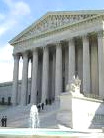| The Supreme Court on Monday rejected a tobacco industry appeal on two issues in a Florida class-action case that has already resulted in a $145 billion punitive award against the cigarette makers being overturned. The industry appealed a ruling by the Florida Supreme Court last year that jury findings, including deception and negligence by the companies, could be used in individual lawsuits by the former class members. In the other issue appealed to the nation's highest court, the industry said the generalized jury findings rested on evidence, arguments and theories of liability that were preempted by a federal law, the Federal Cigarette Labeling and Advertising Act. A Miami jury ruled in 2000 that the tobacco companies deceived smokers about the dangers of cigarettes and ordered the companies to pay $145 billion to ailing Florida smokers, estimated to number about 700,000. The case, filed by Miami Beach pediatrician Howard Engle in 1994, was the first smokers' lawsuit to be certified as a class action. But a Florida appeals court overturned the punitive damages award and decertified the class action, a ruling upheld by the Florida Supreme Court. Defendants in the case included Altria Group Inc's Philip Morris USA unit; the R.J. Reynolds Tobacco Co and Brown & Williamson units of Reynolds American Inc; the Lorillard Tobacco Co unit of Loews Corp., which trades as Carolina Group; and Vector Group Ltd's Liggett. In the Supreme Court appeal, the companies said the constitutional right of due process "prohibits a state court from giving preclusive effect to a jury verdict when it is impossible to discern which of numerous alternative grounds formed the basis for the jury's finding of wrongful conduct." They also argued that a plaintiff may not avoid federal preemption under a 1992 Supreme Court ruling by merely invoking characterizations such as "fraud" and "negligence."
|





